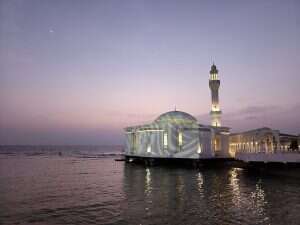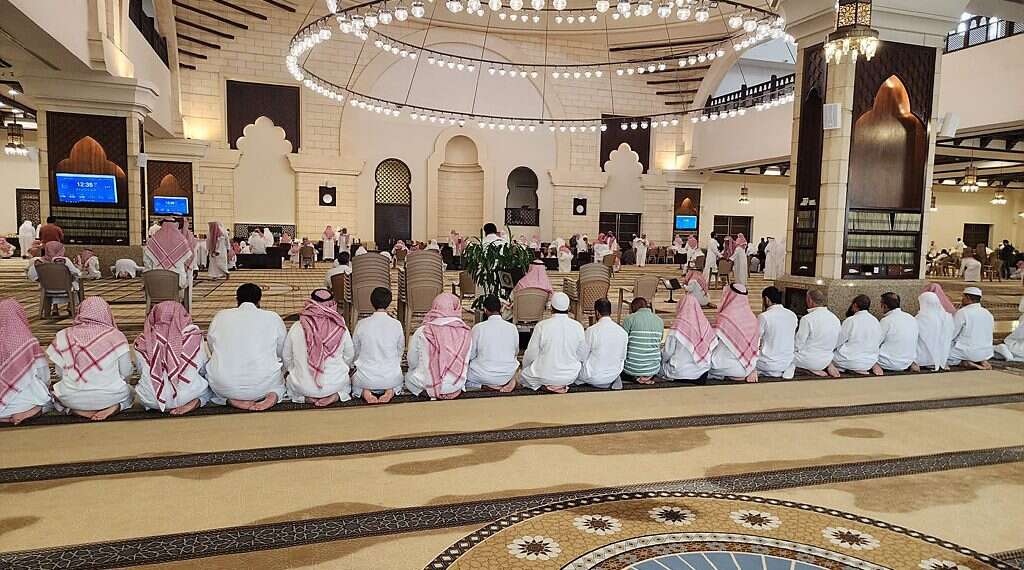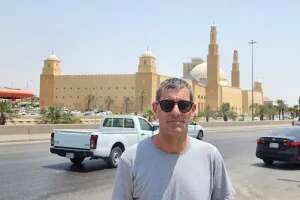

When visiting Riyadh, I went to a local bazaar that has an outdoor flea market. One of the vendors, who had his children with him, was selling plastic bead necklaces and I was interested in a red one.
“It’s 100 riyals,” he tells me, and I immediately reply that it is too pricey.
“Other shops carry these for 400,” he replies in an attempt to persuade me and asks me where I’m from.
“From Israel,” I say as he looks at me in amazement.
“From where? Israel? I cannot believe it!” he says as if he has just witnessed a miracle. He bursts out laughing, and says, “Israel is good. It will be good, God willing.”
Despite the hefty price, I decide to buy the necklace. I ask the vendor his name and he says it’s Abdulaziz, just like the first king of Saudi Arabia – Abdulaziz bin Abdul Rahman Al Saud – the father of the kingdom’s current leader King Salman, and grandfather of Crown Prince Mohammed bin Salman.
This is the first time Abdulaziz meets an Israeli because even if others visited Saudi Arabia in the past they did not present themselves as such. But there is no reason to hide one’s Israeli identity in Saudi Arabia as the nation is very welcoming and hospitable, a characteristic that remains despite other rapid changes.
And the changes have been very rapid indeed as I visited Riyadh a mere year ago. Nevertheless, I need to remember that it is still Saudi Arabia – a very conservative and religious country. They solved the dilemma of whether and how to address female staff in shops themselves. They are cheerful and most speak English fairly well and are eager to help. Lots of them wear hijabs with only their eyes and mouth visible, but many also keep their faces uncovered.
This time around I also visit the port city of Jeddah, where I come across a young female entrepreneur standing at the entrance of a store. It turns out she is an artist and the shop will only open next month as it is undergoing renovations along with the rest of the district.
The area is impressive and reminds one of Morocco’s mellahs. It is an old district, densely built with centuries-old homes made of stone and sand that have been abandoned for generations. But like everything else in Saudi Arabia, this district too is changing.
The young entrepreneur says she is a local, but spent several years in the United States, which is why her English is fluent. There are others in the store as well, fellow artists, each with his or her own aspirations and dreams. And that is what is different about Saudi Arabia: now they can dream in color.
The Jeddah municipality must realize that this is a bustling artists’ quarter that would draw many tourists. But it will take time because Saudi Arabia is not the most tourist-friendly country. There aren’t many attractions and it is quite difficult to get around.
Most tourists in Jeddah are pilgrims who mostly pass by on their way to the Hajj in Mecca. Those who do come to Jeddah as their destination are mainly businessmen and diplomats.
There is almost no public transportation in Saudi Arabia. There are few buses, mainly from the suburbs, for the poorest population. In a country where vehicles are cheap and fuel is even cheaper, everyone has a car. As such, there are almost no sidewalks and everything is adapted to cars, which also means that the only way for visitors to get around is by renting a car or taxiing.
There are three types of taxis: Uber, white taxis, and green taxis.
Uber works the same way it does in the rest of the world. White taxis can be flagged down in the street; they have no meter and the price is agreed upon in the beginning and can be bargained. Green taxis are public ones; they too can be flagged down in the street and the driver puts on the meter if requested.
The rides are cheap because gas is cheap, but one problem is that the drivers barely speak English. Most of them are foreign workers from Southeast Asia and ask you to put in your destination on your phone and keep your device until the end of the ride. The first time this happened, I was surprised; The second time I understood that it was how they worked. By the way, during the entire journey they talk on their phones, endless conversations that make them even less attentive.
Both Riyadh and Jeddah are large cities, so getting anywhere takes about 20-30 minutes. The cities are built horizontally, with no towers and everyone living in houses, which takes up a lot of space.
Riyadh drivers seem more careful, perhaps because the city is full of speed enforcement cameras, while Jeddah drivers are wild, which is why the municipality built speed bumps every dozen meters.
Traveling from one city to the other takes a while too. Jeddah, despite its proximity to Mecca, is more laid back. It is a port city with quite a few sites scattered along the shores of the Red Sea, from the 30-kilometer promenade and the King Fahd’s Fountain to the magnificent Al-Rahmah Mosque on the water, which is visited by Saudis of all socioeconomic backgrounds.
The weather is completely different in each city as well. Jeddah is like Tel Aviv, only way hotter and more humid, and Riyadh is like Beersheba, only dryer and more arid.
Both cities are most active at night as markets close at noon due to the heat and people only go outside after sunset. Restaurant and shop hours are the same and all malls and markets are open until 11:30 p.m.
What stands out to me in both cities is the quiet. The adults speak quietly, the children cry quietly, and there is no loud music. The only loud sound is the muezzin call to prayer: all worship is heard over loudspeakers throughout the cities.
Due to the heavy heat, most people spend their days indoors. There is a mall on every corner, and every shopping center has the best local and Western stores.
But as Saudi men wear white robes and women wear black hijabs, one cannot help but wonder who buys all these other clothes and where and when are they worn. Perhaps at home, away from the onlookers, there is a hidden world filled with the latest fashion items, makeup, and perfumes.
Starbucks has countless branches in Saudi Arabia, as do Kentucky Fried Chicken and McDonald’s. Prices are incredibly cheap, certainly compared to Israel, with a Big Mac combo meal costing only 22 riyals (22 shekels or just under six dollars).
Contrary to perhaps the rest of the world, the preferred soft drink of choice here is Pepsi, a result of the boycott of Coca-Cola in the 1960s for conducting business with Israel. The price of Pepsi is three riyals and water can be found as cheap as 1 riyal.
Prices in restaurants are higher, although still significantly lower than in Israel. Local cuisine is excellent – a mixture of Bedouin food with Arabic and Indian influence.
Khayal served delicious salads for appetizers and a bread basket that the waiter kept refilling “so that the bread stays warm” (the main course – skewers – were so-so) and the Najd Village in Riyadh had the finest lamb maqluba.
Najd Village is particularly popular among expats but locals as well, including women. They even have special private areas for women where they can eat and remove their face covering comfortably.
At a local coffee shop, I come across a picture that represents modern Saudi Arabia: a group of men enjoying coffee and next to them their wives enjoying their beverages separately. They are no longer at home, but not yet together either.
And then there are the movie theaters. All films can be viewed in the original or Arabic dubbing. And if there is proof that Saudi Arabia is progressing it is perhaps the fact that the most popular movie shown during my visit to the country is “Barbie.” “Oppenheimer” too is screened, coincidentally as Saudi Arabia is seeking a civilian nuclear program.

As Israel and Saudi Arabia do not officially have ties, there is also no communication between the two countries, which means that Israeli SIM cards do not work here. For me to stay in touch with those back home, I needed to buy a different SIM card. I purchased it at the airport, which was much cheaper than in Israel. Some Whatsapp features were restricted, but I received unlimited data and 100 minutes of local calls.
When buying a SIM card in Saudi Arabia, one needs to provide lots of personal information, including passport and visa number. This is how authorities easily and conveniently track people’s movements.
Because Saudi Arabia is much larger than its neighbors, not all locals are wealthy. In fact, the opposite is true: the minority possess the riches while the majority struggle.
This is one of the challenges of MBS who leads a nation whose older generation is conservative and religious and younger generation is progressive and Western.
MBS is very determined to move forward and has the ambitious plan to make Saudi Arabia a leader in every field by 2030.
A good example of this is soccer. After Qatar successfully hosted the FIFA World Cup, Saudi Arabia also wants on board, and then some. The government has already allocated billions to bring the world’s best here and to create a winning league.
Christiano Ronaldo was the first. When he arrived in Saudi Arabia after the World Cup, he was ridiculed, but six months later Jedah’s Al Ittihad already includes Karim Benzema and Fabinho and N’golo Kante, and rival Al-Ahli – Riyad Mahrez, Franck Kessié, Édouard Mendy and Allan Saint-Maximin. And Riyadh is not far behind.
Ronaldo was joined by Aymeric Laporte, Sadio Mané, and Marcelo Brozović at Al Nassr, and across the road, at Al-Hilal, Rúben Neves, Souleymane Coulibaly, Sergej Milinković-Savić, Aleksandar Mitrović, and the latest and most flamboyant acquisition – Brazil’s Neymar – are playing.
For those unfamiliar, these are soccer superstars, who could have played a few more seasons for the best leagues of Europe, but came to Saudi Arabia because of the cha-ching.
But in general, when it comes to money matters, Saudi Arabia is humble. Unlike the United Arab Emirates or Qatar, there are no luxury cars here, and people don’t flaunt their wealth. Class solidarity actually stands out, especially in mosques where the rich and the poor pray together.

Despite no official ties, Israel and Saudi Arabia do interact behind the scenes, especially in trade. Quite a few representatives of Israeli companies (with foreign passports) come to Riyadh to cooperate in the fields of technology, agriculture, and security – all with the blessing of authorities.
Saudi Arabia has a vested interest in Israel, mainly related to dividends. High-tech is one such priority, given Riyahd’s 2030 vision, as are artificial intelligence and cyber.
At the same time, the Saudis want Israel to serve as a bridge to the United States in order to soften the ambitious list of demands they set for the Biden administration as a condition for a regional mega-deal.
It’s unclear to what extent Israel is an effective bridge to Washington, considering the current state of affairs between the Biden administration and the Netanyahu government. And yet, one shouldn’t take lightly the power it holds as it wants to torpedo the deal due to controversial demands, such as a civil nuclear program for Saudi Arabia that will include uranium enrichment on the kingdom’s soil.
Such a program, which could easily be converted into a military nuclear one (Iran too claims that its nuclear program is for civilian purposes), goes against American and Israeli principles, particularly the Begin Doctrine, under which Jerusalem will not allow any country in the region to develop nuclear capabilities. The Biden administration, in turn, is desperate for an international achievement ahead of the presidential elections next year, which is why it is pushing for such a deal.
Saudi Arabia has recently been visited by Secretary of State Antony Blinken and National Security Advisor Jake Sullivan to discuss the details of the pact that would also include a dramatic upgrade of Riyadh’s military and security capabilities as well as NATO-like security guarantees from Washington.
When Biden first took office almost three years ago, he never would have thought of seeking Saudi favor. MBS was a persona non grata, mainly due to the assassination of journalist Jamal Khashoggi, who opposed the Saudi rulers, in 2018.
But then came the Ukraine war that made oil prices soar, accelerating the rapprochement between Saudi Arabia and China and forcing Biden to rethink his policy. He is now vigorously courting Riyadh in an attempt to revive the historic partnership between the countries.
And the two go way back. The partnership began with the support by Abdulaziz, who as mentioned above, was the first king of Saudi Arabia, of the United States and Britain during World War II. Saudi Arabia provided America with oil and in turn, received security, or at least a sense of security.
But in recent years the partnership began to come apart at the seams.
America’s reduced dependence on oil, on the one hand, and its inability to deal with Iranian aggression toward Saudi Arabia, on the other, severely impacted the ties.
The Saudis were attacked by the Houthis from Yemen and humiliated by a drone and cruise missile attack on the Saudi Arabian Oil Group in 2019. Their expectation that Washington would respond and exact a heavy price from Tehran did not materialize when then-President Donald Trump decided to hold back.
The policies of the next administration only deepened the rift, which is what prompted Saudi Arabia to mitigate the risks. Riyadh began to treat Bejing, its largest trading partner, with open preferential treatment and renewed ties with Tehran.
America realized – alarmingly late – that if it didn’t come to its senses, it would lose its most important Arab support in the region that was now seeking security and defense guarantees elsewhere.
“Biden is eager for a deal and is willing to go very far,” a source familiar with the normalization talks said, adding that officials are working on the nuclear issue to expedite the deal.
One such solution is to establish a US-Saudi project – referred to as “nuclear Aramco” – that would give American companies a direct role in the development and oversight of nuclear power development in Saudi Arabia, but enrichment of uranium would still occur within the kingdom’s borders.
And yet, those concerned about the proliferation of nuclear weapons technology, such as Israel, are unlikely to agree.
“It’ll be madness,” an Israeli official said, expressing concern. “A nuclear race will begin in the region, with Egypt and Turkey and others joining after Saudi Arabia.”
What is more disturbing, he pointed out, is that if something were to happen to MBS, a voice of progress in Saudi Arabia, the world might find itself with an extremely religious and conservative country that now has nuclear capabilities.

Surprisingly, Israel does not automatically oppose this Saudi demand. In the limited and classified discussions that take place under the leadership of Prime Minister Benjamin Netanyahu, the trend is not to rule out the matter outright but “to look for solutions that will allow Israel to accept them.”
It seems that Netanyahu is eager for an agreement too and is ready to compromise, as appears from the latest interview given by his close associate, Strategic Affairs Minister Ron Dermer, to US outlets.
Israeli experts are divided on the matter, with some saying the deal would benefit Israel by strengthening its position and others warning Israel should be able to defend itself on its own.
The benefit of such an agreement, however, is clear: normalization with Saudi Arabia that would create a strong and visible front against Iran and usher in a new era in the Middle East politically, technologically, economically, and security-wise.
{Reposted from IsraelHayom}






![Why You Shouldn’t Be Afraid of G-d – Soul Talk [audio]](https://c622d1ec.delivery.rocketcdn.me/wp-content/uploads/2025/03/light-4681014_640-218x150.jpg)
![Modesty & Matzah – Pull Up a Chair [audio]](https://c622d1ec.delivery.rocketcdn.me/wp-content/uploads/2025/03/matzah-1566456_640-218x150.jpg)















